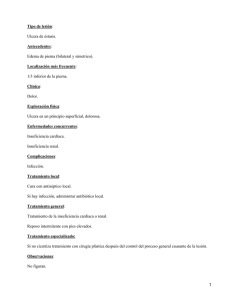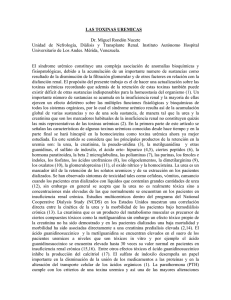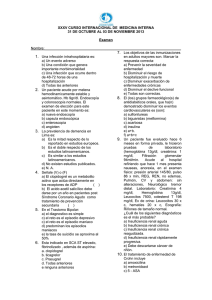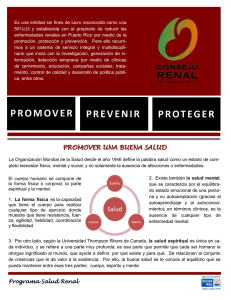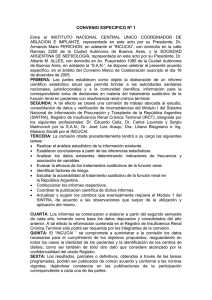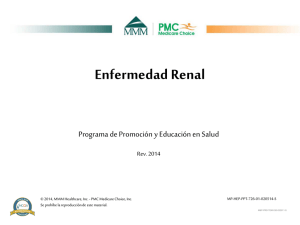Kidney Failure - Spanish - Health Information Translations
Anuncio
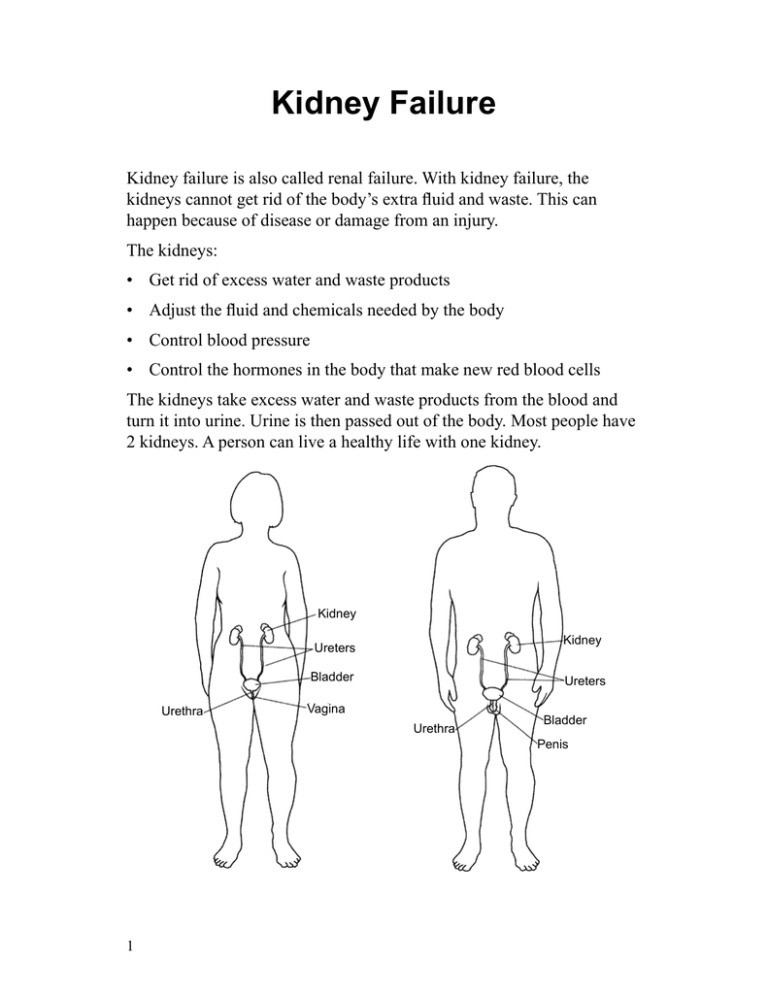
Kidney Failure Kidney failure is also called renal failure. With kidney failure, the kidneys cannot get rid of the body’s extra fluid and waste. This can happen because of disease or damage from an injury. The kidneys: • Get rid of excess water and waste products • Adjust the fluid and chemicals needed by the body • Control blood pressure • Control the hormones in the body that make new red blood cells The kidneys take excess water and waste products from the blood and turn it into urine. Urine is then passed out of the body. Most people have 2 kidneys. A person can live a healthy life with one kidney. Kidney Kidney Ureters Bladder Urethra Ureters Vagina Urethra 1 Bladder Penis Insuficiencia renal La insuficiencia renal también se conoce como insuficiencia de los riñones. Con la insuficiencia renal, los riñones no pueden eliminar el exceso de líquido y desecho del cuerpo. Esto puede suceder debido a una enfermedad o a un daño causado por una lesión. Los riñones: • eliminan el exceso de agua y productos de desecho; • ajustan el líquido y las sustancias químicas que el cuerpo necesita; • controlan la presión arterial; • controlan las hormonas del cuerpo que producen nuevos glóbulos rojos. Los riñones toman el exceso de agua y productos de desecho en la sangre y lo transforman en orina. Luego la orina se elimina del cuerpo. La mayoría de las personas tiene 2 riñones. Una persona puede llevar una vida saludable con un riñón. Riñón Riñón Uréteres Vejiga Uretra Uréteres Vagina Uretra Kidney Failure. Spanish. 1 Vejiga Pene There are 2 kinds of kidney failure called acute and chronic. Acute Kidney Failure Acute kidney failure is a sudden loss of kidney function that happens within hours or days. Causes may include: • Severe infections • Severe burns • Injury to or blockage of the blood flow to the kidneys • Some medicines, and alcohol or drug abuse • Low blood pressure • Blockage in the urinary tract • Heart failure The kidneys can often get better when the cause of the problem is found and treated. Dialysis may be needed to help remove waste from the body until the kidneys are working. Chronic Kidney Failure Chronic kidney failure occurs when the kidneys slowly lose their function. It is a lifelong disease that does not get better. Causes may include: • Diseases such as diabetes, high blood pressure and heart disease • Kidney stones • Blockage or problems in the urinary tract 2 Existen dos tipos de insuficiencia renal, llamadas aguda y crónica. Insuficiencia renal aguda La insuficiencia renal aguda es una pérdida repentina de la función del riñón, que sucede en horas o días. Las causas pueden incluir: • infecciones graves; • quemaduras graves; • una lesión u obstrucción en el flujo sanguíneo a los riñones; • algunos medicamentos y el abuso de drogas o de alcohol; • presión arterial baja; • obstrucción en las vías urinarias; • insuficiencia cardíaca. En general, cuando se detecta y se trata la causa del problema, los riñones pueden mejorar. Hasta que los riñones funcionen, puede ser necesario someterse a diálisis para ayudar a eliminar los productos de desecho del cuerpo. Insuficiencia renal crónica La insuficiencia renal crónica sucede cuando los riñones pierden lentamente su función. Es una enfermedad de por vida que no mejora. Las causas pueden incluir: • enfermedades como la diabetes, hipertensión arterial y enfermedades cardíacas; • cálculos renales; • obstrucción o problemas en las vías urinarias; Kidney Failure. Spanish. 2 • Lupus, an autoimmune disease • Scleroderma, a skin and connective tissue disorder • Chronic infections • Some medicines taken over time for other conditions, and alcohol or drug abuse Signs of Chronic Kidney Failure include: • Swelling in the body, such as hands, face or feet • Changes in how often you need to urinate • Feeling very tired or weak • Headache and confusion • Nausea or vomiting • Loss of appetite • Feeling short of breath • Itchy skin There is no cure for chronic kidney failure. It is treated with diet changes and medicines. When the kidneys lose most of their function, called end-stage renal failure, dialysis is needed several days a week. A kidney transplant may also be a treatment option. Talk to your doctor or nurse if you have any questions or concerns. 2008 – 6/2012 Health Information Translations Unless otherwise stated, user may print or download information from www.healthinfotranslations.org for personal, non-commercial use only. The medical information found on this website should not be used in place of a consultation with your doctor or other health care provider. You should always seek the advice of your doctor or other qualified health care provider before you start or stop any treatment or with any questions you may have about a medical condition. The Ohio State University Medical Center, Mount Carmel Health System, OhioHealth and Nationwide Children’s Hospital are not responsible for injuries or damages you may incur as a result of your stopping medical treatment or your failure to obtain medical treatment. 3 • lupus, una enfermedad autoinmune; • esclerodermia, un trastorno de la piel y el tejido conectivo; • infecciones crónicas; • algunos medicamentos tomados durante algún tiempo para otros problemas y el abuso de drogas y alcohol. Entre los signos de la insuficiencia renal crónica se encuentran: • hinchazón en el cuerpo, como por ejemplo, las manos, la cara o los pies; • cambios en la frecuencia de la necesidad de orinar; • sentirse cansado o débil; • dolor de cabeza y confusión; • náuseas o vómitos; • pérdida del apetito; • falta de aire; • piel con picazón. No existe una cura para la insuficiencia renal crónica. Se trata con cambios de dieta y medicamentos. Cuando los riñones pierden la mayor parte de su función, lo que se llama insuficiencia renal en etapa terminal, se necesita diálisis varios días a la semana. Un trasplante de riñón también puede ser una opción de tratamiento. Hable con su médico o enfermera si tiene alguna pregunta o duda. 2008 – 6/2012 Health Information Translations Unless otherwise stated, user may print or download information from www.healthinfotranslations.org for personal, non-commercial use only. The medical information found on this website should not be used in place of a consultation with your doctor or other health care provider. You should always seek the advice of your doctor or other qualified health care provider before you start or stop any treatment or with any questions you may have about a medical condition. The Ohio State University Medical Center, Mount Carmel Health System, OhioHealth and Nationwide Children’s Hospital are not responsible for injuries or damages you may incur as a result of your stopping medical treatment or your failure to obtain medical treatment. Kidney Failure. Spanish. 3
